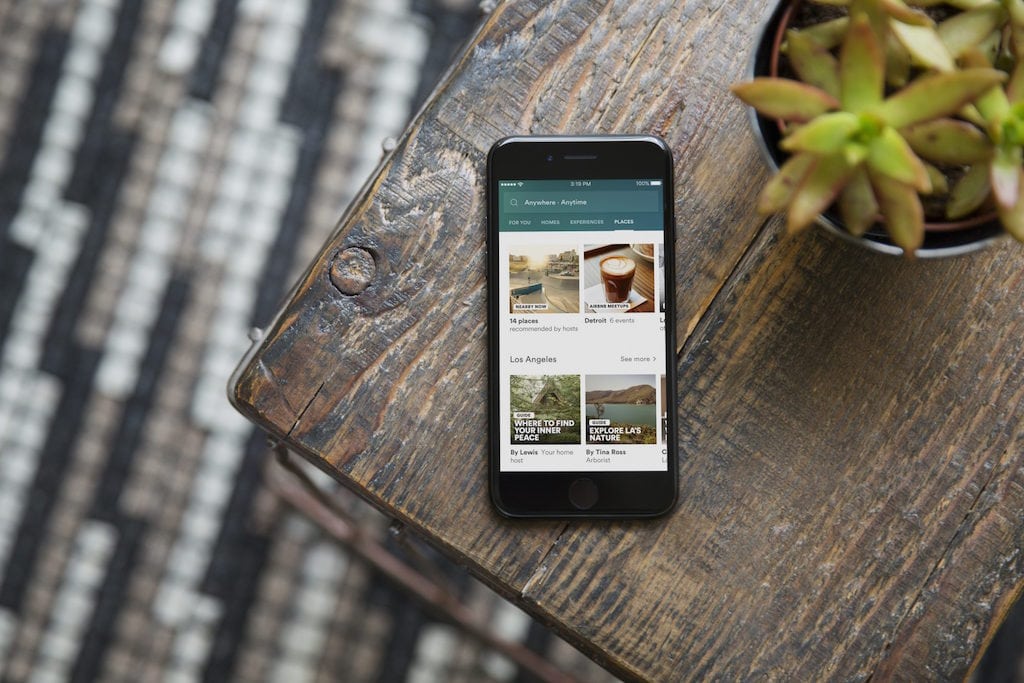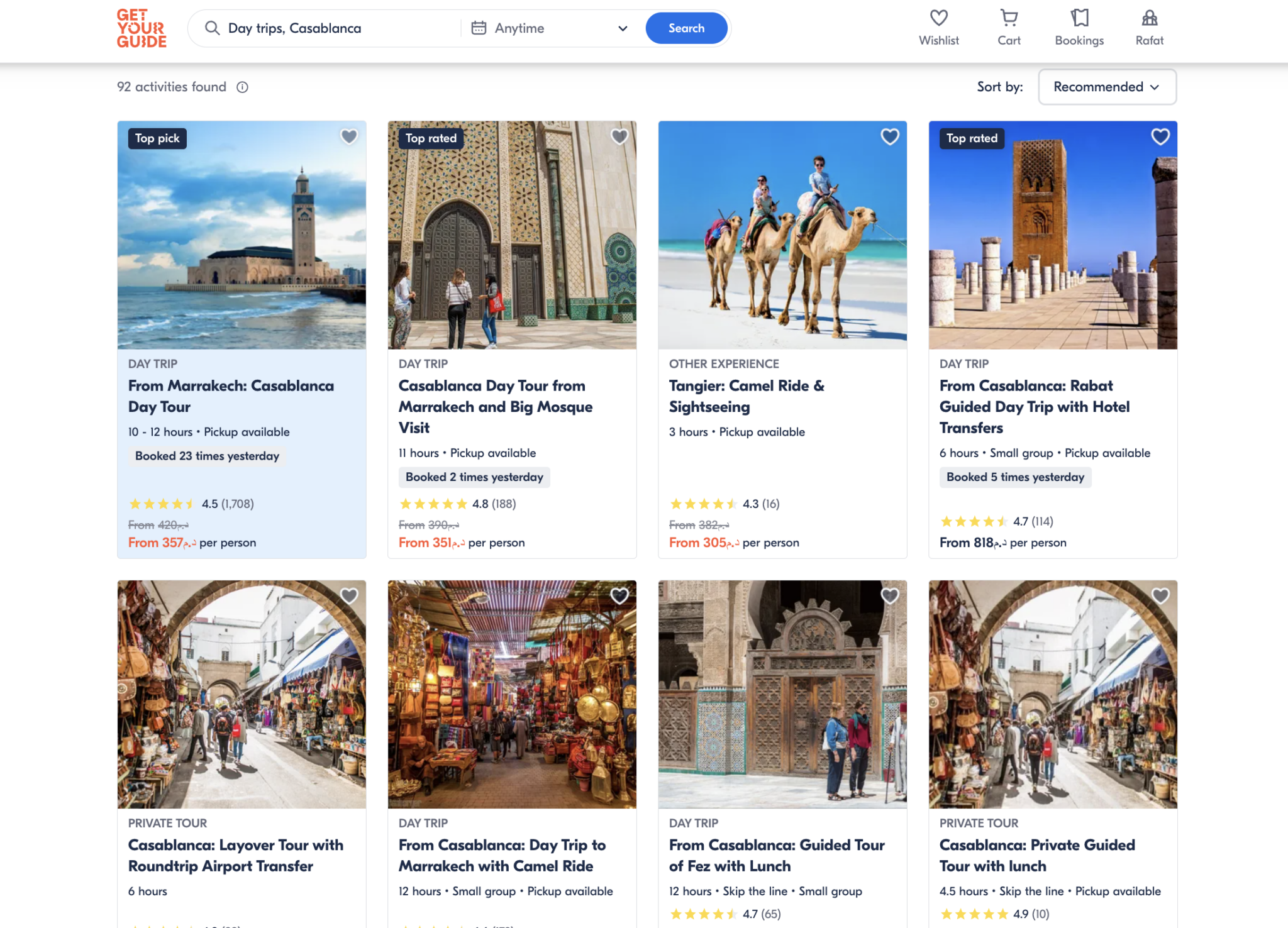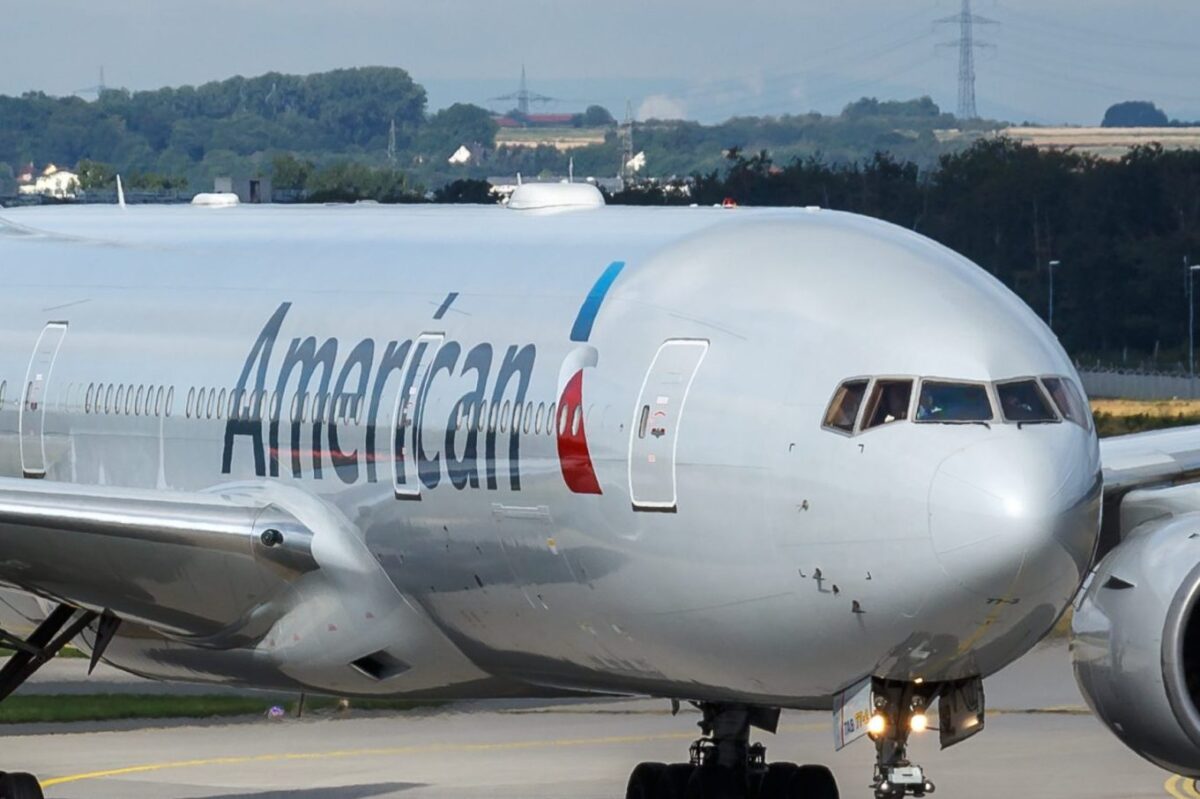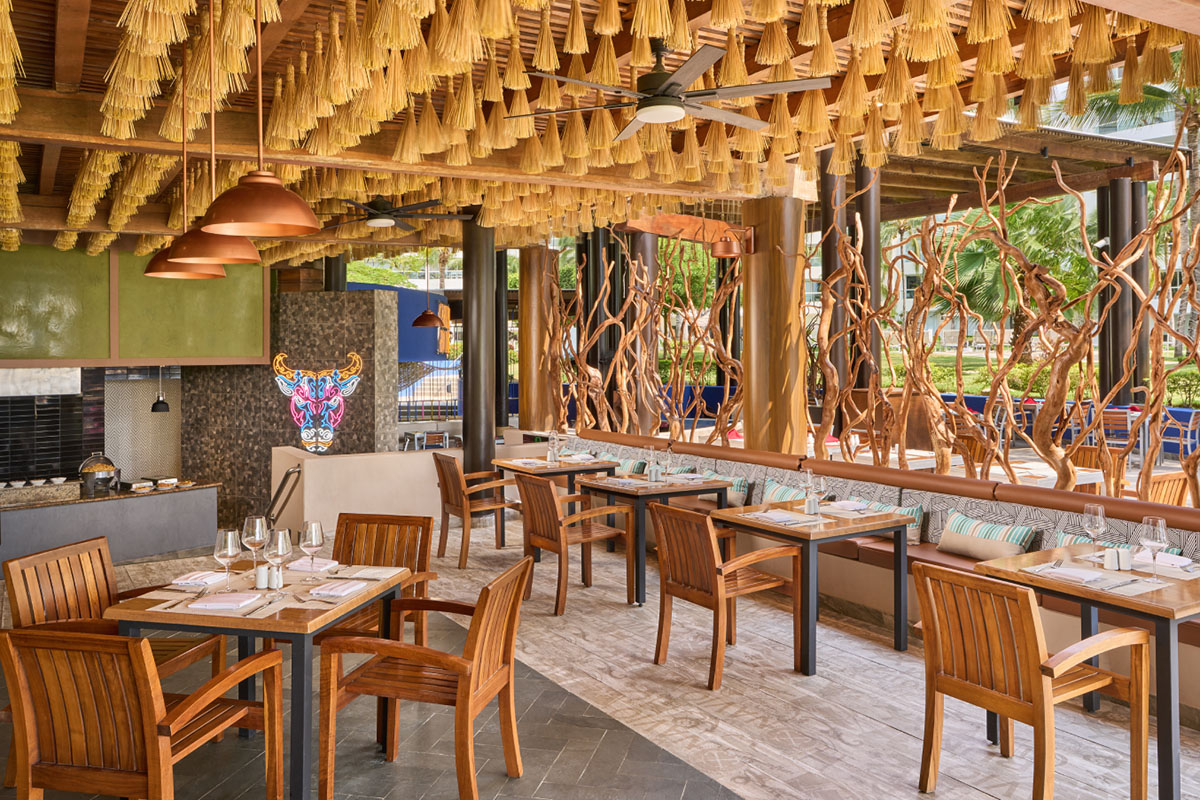This Is Why Airbnb Is Doing What It’s Doing With Trips and More

Skift Take
When Airbnb CEO Brian Chesky announced on Nov. 17 at the Airbnb Open in Los Angeles, that Airbnb would be entering the tours and activities market, we here at Skift, weren’t surprised at all.
However, when Chesky announced the company had also unveiled new in-destination mobile app features as part of its Places function (Insider Guidebooks, Meetups, free audio walking tours, and, eventually, restaurant reservations) we’ll admit, we were a bit surprised, but not entirely.
When Chesky teased at Airbnb Flights and Services, we were surprised, but that’s also when it all clicked: Airbnb has much bigger ambitions beyond just tours, beds, and in-destination information. Indeed, by all accounts, it seems like Airbnb is attempting to transform itself into a new breed of online travel agency (OTA).
That “super-brand of travel” appellation that Chip Conley, Airbnb global head of hospitality and strategy, coined a few days prior to the big announcement wasn’t a lofty ambition — it’s a very real goal. Whether or not Airbnb succeeds in its biggest gamble to date, only time will tell.
Shortly following the big announcement, Skift sat down and spoke with Conley, as well as Airbnb’s North America product manager, Andrea La Mesa, to get a clearer picture of the company’s overall game plan.
Here are the highlights and takeaways we gathered from our conversations with them.
Why Airbnb Grew the Way It Did: Quantity vs. Quality
If you want to look at what Airbnb’s done as the next step in the company’s evolution, it helps to understand its history. Conley said to get to this point in the company’s story, Airbnb needed tremendous scale — it needed those three million listings in 191 countries around the world — to be able to pull off what it just revealed two weeks ago in terms of adding tours and activities, and plenty more.
“Airbnb is a marketplace,” Conley said. “The home as marketplace: it grew. It needed to grow. In some ways, what I like to say is that we needed to grow the quantity before the quality was even more important. At some point, quality creates quantity.”
And because Airbnb is a marketplace, it needs a “network effect” to grow, something also mentioned often by hotel CEOs like Hilton’s Chistopher Nassetta.
“You could be a marketplace that’s really great, but if no one knows about it, and if buyers and sellers aren’t all going there, it doesn’t have that network effect,” Conley said. “You have to have a certain amount of quantity. In the travel business, it’s a global network effect. It’s a global network effect. Therefore, that quantity thing is really important. We needed to just grow globally in all markets.”
Conley’s comments about scale echo what other industry experts have said with regard to the company’s decision to enter the tours, activities, and in-destination marketplace. In order to succeed in this business, you need to have scale and access to millions of users, something Airbnb certainly does.
“I’ve always heard that, trying to solve in-destination experiences and tours and activities is where startups go to die,” said David Jacoby, a San Francisco-based Airbnb host and CEO and co-founder of Hostfully, a startup that helps hosts create personalized guidebooks for their guests. “It’s tough. It’s really tough.”
Scale, Conley said, was a crucial part of the equation but he added, “There’s a point at which quantity alone can be dangerous if quality isn’t matched with it. I think I joined the company at exactly that time that they were smart enough to know [the importance of] hospitality. They were a design company with a technology background. The three founders were the designer technology people. The third leg of the stool is hospitality, which spoke to quality measures and quality aspirations. It became a quantity and quality company for a little while. Over time, on the home side we have gotten more and more focused on quality.”
It’s that experience of adding hospitality to its Homes product that is now helping Airbnb ensure the quality of its new Trips product, Conley said. “We have taken all of that knowledge and we’re saying, when it comes to Experiences, we want to start from a place of quality a little bit more. We don’t have to go and have the whole world overnight. If we did the Homes thing like we’re doing here, starting with 12 markets, it would have been different. What you need to know going forward is, baked into Trips, is quality, more from the start.”
Super-Travel Ambitions
Conley said he didn’t want to “sound very self-congratulatory” by using the term “super brand of travel,” and he stressed that the company wants to become that “with humility.” He said that, when he initially joined the company, Airbnb was fielding a number of opportunities to grow, but that they were mostly limited to spaces.
He said, “Even back then there were people who were saying, ‘Well, why don’t you get into the conference space business? Or the office space business? You’re in the space business. You just, through technology, help marry demand and supply.’ From an objective, almost technician way, you could have said, ‘Okay, yes, we should be in the space business.’ I said, ‘Oh no, we’re in the travel business.’ Ultimately, internally, there’s this internal mantra [where we ask ourselves], “Do we want to be the most loved brand in travel, or the super brand of travel?”
He said that although Airbnb fields hundreds of “wild ideas” from different companies, if the company wants to do business with Airbnb, it has to be involved in travel, period.
“That looks obvious now, but I will tell you, three years ago we could have gone into a bunch of different paths that would have been things that, strategically, maybe they would have made sense but, frankly, based on who we are today, they make no sense at all,” Conley noted.
When Skift asked Conley what he would like people to associate with Airbnb, he said, “The status today, it’s [about] being in the know. Finding things and being able to share that with friends is so essential. It’s essentially part of the culture we are in today. What I would want people to think, what we would want people to think about the Airbnb personality or the brand, is that it’s like your local friend, the local friend who helps you to find the hidden treasures in the place you’re going to.”
Airbnb as a Brand-New Kind of OTA
If Airbnb’s new suite of products makes you wonder, like us, if they’re aiming to become the next TripAdvisor, you might not be too far off the mark. But if you listen to Conley, the comparisons aren’t apples to apples.
“You have to have an editing function and an idea of being the most loved brand in travel and creating a community,” he said. “I think one of the things that comes out more and more, and I think it may have come out in my Phocuswright talk a little bit is, and this is nothing against Booking.com or Hilton. They’re great companies. They might do a conference. They might do a conference, like franchisees. Or Booking, I don’t know who they would do it on, but they wouldn’t do a festival, and they wouldn’t have a passionate community.”
He said, at the Phocuswright conference, that Airbnb doesn’t “want to be a transactional business. Most OTAs are transactional businesses. We want to be a transformational business because margins are better, but not just because margins are better. Because we want to actually transform people’s lives.”
What separates Airbnb from TripAdvisor and other online travel agencies and review sites is that sense of community that’s unique to Airbnb, Conley claims. That explains, in part, why the company also decided to work with individual hosts or nonprofit organizations to develop its new Trips product, as opposed to working with established tour operators.
“See, taking a community that is based upon a URL, and turn it into the IRL, in real life experience in person, is like creating a pilgrimage,” Conley said, echoing Chesky’s reference to Joseph Campbell’s The Hero’s Journey, which was also referenced in this year’s Skift Supertraveler Manifesto.
With Airbnb’s new in-destination services, Conley said the goal was to just make trip planning easier, but also more edited and curated than other sites.
“What we thought about is: What are the elements that go into the trip planning?,” Conley said. “At the scale that we’re at now, there are things we can influence. Yes, some of that is TripAdvisor-like, but Places was certainly one of those. Having a point of view was important for us. Again, it’s a very strange thing because in some ways we’ve gone from the marketplace, to having everything and it being laissez-faire to now, where it’s a little bit more manicured. It’s a little bit more vetted and curated.”
Quality Control Will Play a Part in Trips
Vetting will also play an important role in how Airbnb approaches Trips, La Mesa said, and it’s a different kind of curation than Airbnb has taken with its Homes.
“We have created what we call the ‘Airbnb Vetting Protocol,’ which means that, in the core business, anyone can create a listing and start hosting. That creates a ton of diversity in the types of Homes. In this case, [with Trips,] we have a managed marketplace, which means that hosts basically go through a quality vetting process. It’s multiple steps. What we try to do is understand who they are, so we identity verification. Are they really who they say they are? What is the idea? What is the experience they want to create? And what qualifications they have in order to deliver that?”
La Mesa also said the company is making sure hosts who participate in Trips understand local laws and regulations and take safety and security into account.
“We think that by sharing this information with them upfront, by having a clear risk assessment and vetting process, we can control quality in a more sophisticated way,” he added.
Because Airbnb wants to pay close attention to the quality of the Trips, it’s scaling the product deliberately — and much more slowly than the company did with Homes.
“Now then, how do you scale that? That will be one of our challenges, and also with the level of authenticity and the scope [we want to deliver],” Conley said. “Then the ability to scale it, not just in 12 markets, in 50 markets, but all over the world. We’ll see. I feel pretty good about it because it’s been the No. 1 question that we’ve been asking ourselves.”
He added, “I think that we have the ability to be the best in the world as a travel company on our personalization and customization, every time. This is the direction we’re going. Especially once you select certain tours, we know you better. That has great potential for us. It’s going to actually help build demand for the whole space.”
Expanding What It Means to Be a Host
With Trips, Airbnb has changed what it means to be an Airbnb host. “We’re changing the meaning of the word ‘host’ because now you don’t need a home anymore,” La Mesa said. “You can start hosting, you can share your passion, and you can earn some income without needing an extra space. Not everyone has extra space. We will give access to a lot of people that today cannot participate in the travel industry.”
“The part that I’m excited about is, I think, [Airbnb Trips] is going to build supply,” Conley said, of the tours and activities marketplace. “There are going to be people out there who are going to say, ‘Gosh I want to do this. I have something that I’ve always imagined doing and I’m just going to do it part-time. Every Saturday, I’m going to lead a tour, or I’m going to have someone come into my studio and teach them how to paint.’ That’s interesting. What that leads to is people earning money in new ways.”
The company’s expansion into Trips also adds another revenue stream for Airbnb, which takes a 20 percent commission for each Trip booked, unless that Trip is being hosted by a nonprofit organization.
Some industry watchers speculate that Airbnb’s desire to enter this market was as much motivated by a desire to make travel “both magical and easy” as Chesky noted in his keynote, as well as a desire to compensate for potential lost income from Homes in cities like San Francisco and New York City, where the company and other short-term rental platforms face intense scrutiny and regulations.
Airbnb’s Future
When we asked Conley and La Mesa to elaborate further on Airbnb’s possible entry into Flights and Services, there wasn’t much they would reveal but, they did give us a few hints.
“Transportation,” La Mesa said, “is an important part of the trip because you need to go from A to B, but at this stage, this was more like a vision statement versus something that we’re actually sharing now.”
Conley was a bit more descriptive, and given what he told us, we wouldn’t be surprised if more Home listings, in the future, were marketed and packaged in a similar manner to the new Trips product, and given the full cinematic treatment.
“Just know that Trips and experiences were very much a function of our own deep dive understanding of Homes,” he said. “Just know that it will become an educator for how we do Homes. With some of the things you’ve seen here today, don’t be surprised if we evolve homes in that direction. I can’t say anything more than that, but that’s a great little teaser to say, ‘This is sexy.’ It is cinematic in terms of the visual. Know that video is more and more important on the Internet. It’s going to be more and more important for us for Trips and Experiences. Why wouldn’t it not be for other things as well? That’s about as much as I can say.”
He continued, “The video component: There are going to be people saying, ‘Okay, so how do we apply that? Video is really hard.'” Conley said that Airbnb’s decision, early one, to provide free photography to hosts for their home listings may have “sounded crazy” at the time, “but it actually maybe helped build the brand in many ways. It’s certainly, for a designer and a brand, a really important cornerstone.”
He added, “Similarly, if we believe things are going in the video direction, we’ll go more in that direction. How do we keep the quality control there? How do you scale it? These are big questions. I don’t have the answer to that yet. We have some ideas of it, but we’ll see if we’re on the right path. I think you’ll see more other companies trying to do the same thing.”
Defining The Future of Travel
The future of travel, Conley told us, can be summarized in a simple acronym: MNOP (Mobile; Now, on-demand services; Options; and Personalization).
“Companies that actually get all of those right can be remarkable,” Conley said. “If you get a few of those right, two or three of them, or even one, and you’re just damn good at that one, it might help.”
“The mobile side is not just, how does it look in web design in a mobile format? The now is obvious: on-demand services. The options: That’s part of the reason that Airbnb has done well; it’s the plethora of choices. If you have a plethora of choices, without the personalization and customization over time, that can be the paradox of choice, however.”
He added, “MNOP, to me, defines it. Of those four, the one I’m most turned on by is the P. The personalization and the customization. I do think when it comes to travel, it was built on Maslow’s hierarchy and needs a guide. It was built on a model of Holiday Inn and the chain hotels which were all about predictability and safety. It was one size fits all. You want your hotel in Denver to be just like the one in Dallas. That is so antithetical. Of course, the hotel industry figured that out a little bit 10 years ago, and has been moving in that direction. It’s an industry that’s hard to move quickly because of franchisees.”
“The idea that you literally can have personalization built into your experience is something some hoteliers have talked about, about how your room can be personalized for you. It’s hard to do that, but could there be a day in the future where you’re actually checking into your Airbnb or your hotel, and there’s a hologram of your favorite painting on the wall that actually looks like a real painting? That level of personalization and customization using artificial intelligence and machine learning, is not that far off in the future. It’s only going to be appropriate for the companies that actually can get there quickly.”




